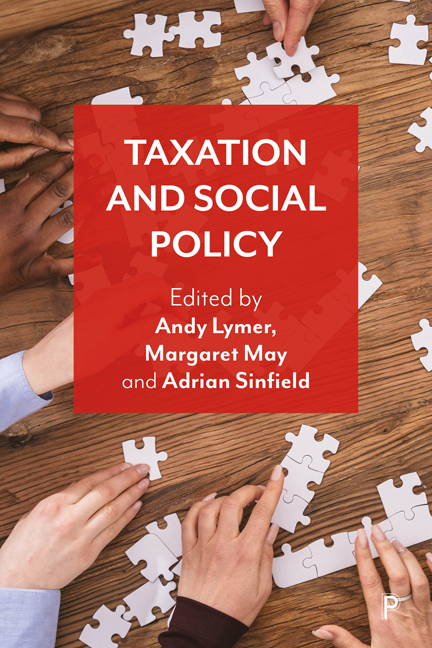Book contents
- Frontmatter
- Contents
- List of figures and tables
- List of abbreviations
- Notes on contributors
- Acknowledgements
- 1 Introduction: The case for considering taxation and social policy togethe
- 2 Fiscal and social policy: two sides of the same coin
- 3 Tax and the social policy landscape
- 4 Fiscal welfare and tax expenditures
- 5 Employment, self-employment and taxation
- 6 Pensions and taxation
- 7 Tax, benefits and household income
- 8 Taxation, health and social care
- 9 Homes, housing and taxation
- 10 Wealth taxation: the case for reform
- 11 Gender and taxation
- 12 Taxation and local taxes
- 13 Corporate tax and corporate welfare
- 14 The climate crisis and taxation
- 15 Conclusions: Taxation in a social policy context
- Index
14 - The climate crisis and taxation
Published online by Cambridge University Press: 20 January 2024
- Frontmatter
- Contents
- List of figures and tables
- List of abbreviations
- Notes on contributors
- Acknowledgements
- 1 Introduction: The case for considering taxation and social policy togethe
- 2 Fiscal and social policy: two sides of the same coin
- 3 Tax and the social policy landscape
- 4 Fiscal welfare and tax expenditures
- 5 Employment, self-employment and taxation
- 6 Pensions and taxation
- 7 Tax, benefits and household income
- 8 Taxation, health and social care
- 9 Homes, housing and taxation
- 10 Wealth taxation: the case for reform
- 11 Gender and taxation
- 12 Taxation and local taxes
- 13 Corporate tax and corporate welfare
- 14 The climate crisis and taxation
- 15 Conclusions: Taxation in a social policy context
- Index
Summary
Introduction
In 2019, the UK government became the first major economy to implement a legally binding net zero target. By 2050, any greenhouse gas (GHG) emissions produced within the UK must be reduced as far as possible or offset (HM Government, 2021). Yet few believe the policy framework in place for meeting this ambitious target is sufficient. The Climate Change Committee, the UK government's formal independent advice panel, has called, for example, for stronger, faster action, highlighting a potentially increased role for taxation (CCC, 2019; see also NAO, 2021). The Johnson government's ‘Net Zero Strategy’ (HM Government, 2021) was non-committal.
There is a strong economic case for carbon or energy taxation as a means to reduce GHG emissions: environmental degradation is a negative externality justifying corrective fiscal actions by the state (Pigou, 1932), particularly if focused on the greatest polluters and/or those whose adaption costs are lowest (IFS, 2011). From a social policy perspective, however, because carbon taxes generally increase prices, they raise concerns about distributive implications whether levied on businesses or consumers. Most research suggests that where carbon taxation has been introduced, it is highly regressive (for example, Wier et al, 2005; Feng et al, 2010), and modelling generally reaches the same conclusion (for example, Timilsinas, 2018). This is generally because such taxes are flat rate and levied on goods/services with a low-or negativeincome elasticity of demand, such as household staples, like domestic energy. The consumption of these staples does not change substantially as income falls, so they make up a larger proportion of household expenditure for poorer compared to richer households.
The UK does not currently have a specific carbon tax but has introduced incrementally over a long period a range of fiscal instruments on individuals and businesses that affect the cost/price of GHG emissions. Most were not established specifically to address environmental objectives, but their impact on price signals mean they affect the market for carbon with behavioural and distributive implications.
Very little is known about these implications, individually or as a whole.
- Type
- Chapter
- Information
- Taxation and Social Policy , pp. 238 - 266Publisher: Bristol University PressPrint publication year: 2023



